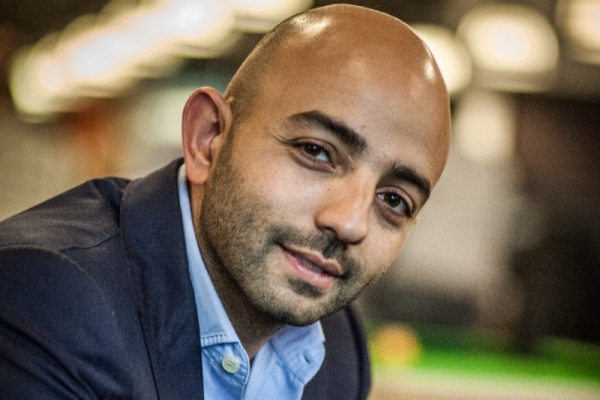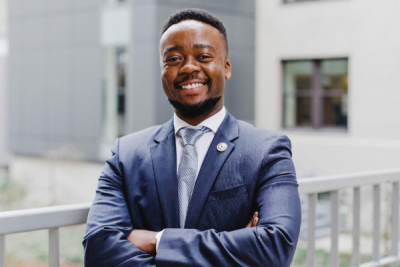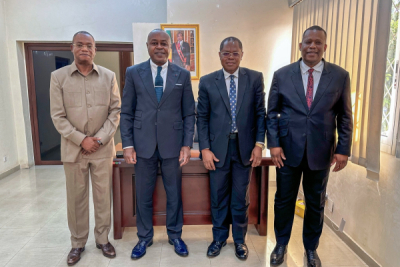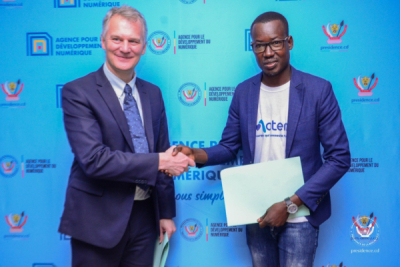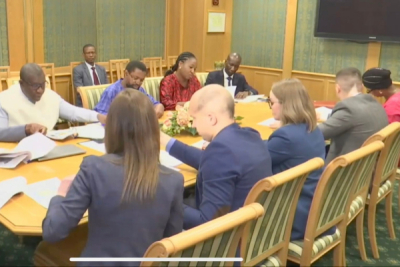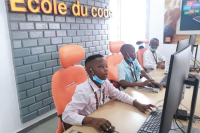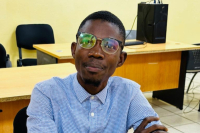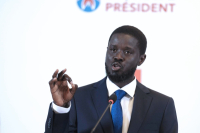With over 20 years of experience in the digital industry, he has held several senior positions.
Moroccan entrepreneur Larbi Alaoui Belrhiti (photo), co-founder and co-CEO of YoLa Fresh, is on a mission to transform the fresh produce sector in Africa. Leveraging technology and data, he aims to enhance the entire fruit and vegetable processing chain, from cultivation to consumption.
Through his startup YoLa Fresh, founded in 2023 with Youssef Mamou, he connects farmers with fresh produce retailers to bolster their businesses. The startup harnesses data, machine learning, and artificial intelligence to predict demand and supply, price dynamics, and other key metrics.
Belrhiti and his co-founder’s primary objective with YoLa Fresh is to eliminate all intermediaries in the food supply chain, enabling retailers to cut costs and farmers to maximize profits more efficiently.
A holder of a master’s degree in computer science from Polytechnique Montréal, Canada, obtained in 2004, Belrhiti is also an alumnus of HEC Paris, where he earned a master’s degree in business administration in 2013.
Before YoLa Fresh, he established several companies. In 2005, he founded TheMafiaBoss.com, an online Mafia-themed game, which he ran as CEO until 2012. In the same year, he also founded Avito.ma, a Moroccan online classified ads site, which he led as Chairman and CEO until 2017, when it was integrated into the Spanish ad group Adevinta (formerly Schibsted).
The entrepreneur’s professional journey began in 2004 at Oracle as a software engineer. He later worked as a consultant at Accenture, a business services company. In 2017, he joined Jumia as the managing director of the company in Morocco. In April 2022, he was promoted to Managing Director of Jumia Express Logistics, a position he held until the inception of YoLa Fresh.
Melchior Koba
TalabaStore, one of the first startups accredited by the Algerian Ministry of Startups, has been experiencing consistent growth since its inception. The company is steadily gaining ground in the Algerian e-commerce sector.
Algerian startup TalabaStore, founded by Sami Aliouche in 2017, facilitates online purchases and home deliveries, with a particular focus on student discounts.
Its platform, accessible via an Android-only mobile application, allows users to create personal accounts and browse a variety of items for sale, including clothing, bags, IT products, cosmetics, and sports goods. Account creation is not mandatory for browsing the platform.
TalabaStore aims to cater specifically to students, offering a range of discounts and benefits to facilitate their purchases. “Our goal is to meet the needs of students in Algeria,” the startup states.
Despite being based in the capital, Algiers, TalabaStore extends its delivery services to 48 wilayas, enabling students across a large part of the country to access their services and benefits. The startup received financing from the Algerian Startup Fund and participated in the incubation program of the Agence Nationale de promotion et de développement des parcs technologiques (ANPT), a government initiative promoting technological advancement in the country. It was also part of the Algeria Venture acceleration program in partnership with Google for Startups.
Adoni Conrad Quenum
He seeks solutions for workplace efficiency concerns. His achievements have already won him several awards.
South African entrepreneur Velani Mboweni, co-founder and CEO of startup Lüla, is connecting workers with private shuttle drivers. His platform offers a sustainable, secure, and affordable transport solution in emerging markets.
Established in 2016, Lüla provides a local service that transports users from their homes to their workplaces and vice versa. The primary clientele of this solution are companies seeking to ensure efficient commutes for their employees.
Mboweni, a University of Cape Town graduate with a Bachelor’s degree in Philosophy, Politics, and Economics, furthered his education with a postgraduate diploma in business administration from Wits Business School in 2016. He also holds a bachelor’s degree in political science from the University of the Witwatersrand, obtained in 2017.
Before Lüla, Mboweni co-founded Phambili Mzansi in 2015, a non-profit organization that facilitates connections between people, knowledge, and resources. He currently serves as a director and board member of Wesgro, an organization that links foreign investors with local exporters in the Western Cape, South Africa.
In addition, Mboweni is a member of the advisory board of the Council for Scientific and Industrial Research, a research organization that focuses on the study, development, localization, and dissemination of technologies to boost socio-economic prosperity in South Africa.
Mboweni, a member of the Harambe Entrepreneurs Alliance African Innovators since 2018, served as the Head of Business Development at eTranzact International PLC, a Nigerian mobile banking and payment services provider, from 2010 to 2014. In 2017, he joined the African Youth Commission, an independent pan-African youth network, as the commissioner for human resources, science, technology, and innovation, a position he held until 2019.
Mboweni’s professional and entrepreneurial career has earned him several awards and distinctions. In 2019, Lüla was named “Start-up of the Year” at the Global Startup Awards. In 2022, he was recognized in the Forbes 30 Under 30 list.
Melchior Koba
Mobile financial services are pivotal to fostering digital inclusion in Africa, a region where a substantial segment of the population lacks access to conventional banking services. Digital technology presents considerable transformational prospects in this area.
The Interbank Electronic Banking Group of Central Africa (GIMAC) is set to assist the Republic of Congo in the implementation of the CongoPay digital platform for financial transactions, confirmed Valentin Mbozo’o, Managing Director of Gimac, following a meeting with Léon Juste Ibombo, Minister of Post, Telecommunications and the Digital Economy, on Monday, March 25.
As part of this upcoming collaboration, Gimac commits to making the platform operational and accessible to all segments of the population. “By supporting a project like CongoPay, it will be possible for many people, even the least affluent and most vulnerable, to benefit from these digital payments, regardless of their purchasing power, standard of living, or societal position,” explained Mbozo’o.
This initiative aligns with the fifth pillar of the National Development Plan (NDP) 2020-2026, which aims to align Congo with the development of the digital economy, enabling everyday simple money transfers using electronic transaction technologies.
The CongoPay platform, set to be implemented by the Digital Development Agency (ADN), also partners with Mediasoft Lafayette, an IT engineering services company based in Côte d’Ivoire. This national platform will augment existing electronic money transfer services in Congo.
Once implemented, CongoPay is expected to facilitate trade and financial transactions in the country. It will also aid in improving the efficiency of public administration, facilitate financial inclusion by providing access to basic financial services, and promote the dematerialization of money in the country.
Samira Njoya
The Democratic Republic of Congo (DRC) has seen significant growth in its digital inclusion in recent years. This growth is driven by the execution of high-impact projects.
On Saturday 23 March, DRC’s Digital Development Agency (ADN) announced a partnership agreement with local startup Motema, which specializes in the manufacture of made-in-Congo touch-screen tablets, and the French firm KaiOS Technologies, which created the mobile operating system KaiOS.
The initiative aims to set up a mobile phone assembly unit with a production capacity of over one million units, to be sold at a flat rate of 20 dollars per piece.
"Thanks to these low-cost phones, users will be able to explore the digital world, opening the way to new educational, commercial, and social opportunities. It's a revolution in technological accessibility, promising to connect Congolese people to the digital age and broaden their horizons," says an ADN press release.
This new partnership aligns with the National Digital Plan Horizon 2025 (PNN), specifically project 21, which advocates for the development of e-commerce in the DRC. The government reports that 14 projects under the PNN have been finalized, and 25% are nearing operational status, bringing the completion rate to 57%. It also aligns with Motema’s goal of providing every citizen with a cost-effective digital device.
Thanks to this collaboration, Congolese people will have the opportunity to purchase 4G mobile phones for 20 dollars. These internationally standardized phones will provide access to the Google search engine and social networks.
Once operational, the project is expected to create jobs in the DRC and enhance the skills of the Congolese workforce through technology transfer between the two organizations. It also aims to combat the digital divide, foster e-commerce, transform the local economy, and significantly improve the daily lives of the Congolese people.
Samira Njoya
Russia has emerged as a significant technological ally in Africa, assisting numerous countries in satellite design. Mali, harboring similar ambitions, has also sought Russia's expertise.
Mali and Russia are collaborating on several imminent projects, including the launch of a telecommunications satellite and the use of Russian spacecraft for monitoring Malian territory, according to a recent announcement. A Malian delegation, led by Finance Minister Alousséni Sanou, visited Moscow to discuss the action plan for these initiatives.
“We need four years to build and then launch the satellite. To achieve this, Mali needs to equip itself with specialists in all fields. We have agreed on a training program for ten students a year for four years in specialized fields relating to satellites… There is also a question of sending a series of specialists to deepen knowledge and acquire expertise in aerospace activities,” Sanou stated.
These initiatives are part of a memorandum of understanding signed last year between the Malian government and Glavkosmos, a subsidiary of the Russian Space Agency (Roscosmos). In addition to aiding Mali in the production of its satellite, the agreement stipulates that a Russian satellite will be made available to the country to meet needs in security, telecommunications, and other sectors that promote national development.
Bamako will also utilize satellite images to gain a precise understanding of the human impact on the environment. These images will assist leaders in better tracking and neutralizing terrorists. This initiative follows the recent liberation of the Kidal region, which had been plagued by terrorism for approximately a decade.
Samira Njoya
Young Africans often wonder how to turn their ideas into successful, sustainable businesses. In Cameroon, Ecolia Labs, through its programs and activities, offers a solution to those worries.
Cameroonian incubator Ecolia Labs is empowering young entrepreneurs to create high-potential, financially viable businesses through digital innovation. Founded in 2014 by Yves Cedric Ntsama, the incubator wants to “build the future generation of tech social entrepreneurs that Cameroon and Central Africa need to meet its sustainable development challenges,” according to its website.
Ecolia Labs provides training in digital skills and entrepreneurship, with courses covering digitization, artificial intelligence, big data, robotics, the Internet of Things, cybersecurity, e-commerce, and web and mobile development. The incubator also offers training in innovative entrepreneurship and a project launch program.
It provides a range of opportunities for entrepreneurs, including pre-incubation, incubation, and financing. The pre-incubation program, lasting one month, allows young innovators to launch their ideas based on market needs. The incubation program, lasting up to 12 months, assists in validating a business model and acquiring initial customers.
Ecolia Labs also provides entrepreneurs with a fully-equipped co-working space, complete with a fiber-optic Wi-Fi connection, to foster collaboration. Additional resources include a manufacturing laboratory and a library.
In addition to its incubation services, Ecolia Labs assists businesses in their digital transformation. It hosts various events, such as the Women Digital Class, which trains women in professional digital skills to enhance their employability.
To date, Ecolia Labs has trained over 10,000 young people, supported more than 300 startups, and received over 20 awards and accolades. As a member of the AfriLabs network, it receives support from Orange, Afric’Innov, Bolloré Transport & Logistics, Ennova, Facebook, the African Union, and Innovation Edge, among others.
Melchior Koba
An Orange Code School’s Success Story, Musa Turay inspires and engages learners from all backgrounds
A software engineer by training, he puts his enhanced skills at the service of the local banking sector.
Musa Turay, a Sierra Leonean computer scientist specializing in web and mobile software development, is among the many beneficiaries of the Orange Code School whose training has significantly impacted his professional life.
He enrolled in the Orange Code School in January 2022 after discovering Sierra Leone’s Orange Digital Center on his Facebook news feed. He seized the opportunity to deepen his skills in full-stack web and mobile application development. Months earlier, in 2021, he obtained his Higher National Diploma in Information and Communication Technology from the Eastern Polytechnic in Sierra Leone.
Turay credits the knowledge he acquired at the Orange Code School for his significant career development, which culminated in a position as a software developer at the Guaranty Trust Bank in Sierra Leone. Hired by the bank in June 2023, he works on developing innovative software solutions to improve banking operations and the customer experience.
With a passion for digital innovation, Turay gained experience in application development and other areas, including database management, before obtaining his national diploma and joining Orange Code School. In 2019, he founded the digital learning platform TurayMathic eLearning to make quality education accessible to everyone, regardless of geographical location.
“At TurayMathic eLearning, our mission is twofold. First, we strive to develop cutting-edge digital learning experiences that inspire and engage learners from all backgrounds. Secondly, we are committed to empowering educators and educational leaders to effectively harness technology in the classroom,” Turay said in an exclusive interview with We Are Tech Africa.
Eager to be among the world’s best in data engineering, software engineering, and DevOps engineering, Turay has returned to studying computer science at the University of the People, an online university accredited by the United States. He also plans to enroll in “training programs or pursue certifications that will deepen [his] expertise and keep [him] abreast of advances in the industry,” he says.
Turay is currently working on an e-commerce platform called We Yon Shop. His aim with this platform is to revolutionize the online shopping experience in Sierra Leone and beyond by bringing together convenience, accessibility, and quality.
“This platform aims to provide a smooth and user-friendly shopping experience, leveraging technology to streamline transactions and improve customer satisfaction,” he explains.
Melchior Koba
According to its co-founder, Ruddy Mukwamu, MaxiCash was inspired by the Apple ecosystem.
MaxiCash, a fintech solution developed by a Congolese startup, is enabling Africans in the diaspora to make payments, transfer money internationally, and pay for various goods and services. The startup, launched in 2016 by Ruddy Mukwamu, is based in Kinshasa, Democratic Republic of Congo, and Johannesburg, South Africa.
“We combined our experience in tech and digital to help communities use technology to foster financial inclusion,” Mukwamu said.
The MaxiCash mobile application, available on iOS and Android, allows users to create an account and access various fintech services. Users can send money internationally, make payments, and shop online in partnership with MaxiCash. The application includes a digital wallet, which can be topped up using various digital payment methods, including bank cards.
MaxiCash also offers Visa bank cards for online payments and receiving international payments. The start-up provides a payment gateway for businesses, enabling those involved in online commerce to integrate MaxiCash’s payment solution to facilitate their financial transactions. According to the Play Store, the application has been downloaded more than 10,000 times.
Adoni Conrad Quenum
During the tenure of Macky Sall, which commenced in 2012, the digital sector emerged as a crucial catalyst for the acceleration and socio-economic development of the country. His successor aims to exceed these accomplishments in the next five years.
Senegal’s newly elected President, Bassirou Diomaye Faye (photo), has outlined plans to accelerate the country’s digital transformation, a process initiated by his predecessor, Macky Sall. Faye, who was elected on Sunday, March 24, sees digital technology as a catalyst for Senegal’s development.
He announced plans to establish a National Fund for the Development of Research and Innovation (FNDRI) within five years. This fund, which will replace the existing Fund to Promote Scientific and Technical Research (FIRST), will finance startups and research and innovation (R&I) initiatives.
The new administration aims to create an incentivized and secure framework for digital entrepreneurship. The goal is to foster a high-performance national ecosystem that can meet the demand for digital products and services across various sectors of the national economy.
Faye also expressed concern about the impact of digitizing public services on the population. He announced plans for a digitized, high-performance public administration capable of meeting the challenges of the new economy. This includes building sovereign data centers, both public and private, with high-speed internet connectivity and lower hosting charges to consolidate state and local business data.
In the education sector, a national priority, the new President plans to reform the licensing system and establish a monitoring system for private higher education institutions. He also plans to support the development of the Cheikh Amidou Kane digital university, strengthen online course platforms in other public universities, and construct technological universities.
Recognizing that these projects depend on good internet connectivity, the new government plans to ensure internet access throughout Senegal. According to a second-quarter report by the Autorité de Régulation des Télécommunications et des Postes (ARTP), the current penetration rate of broadband internet (3G/4G) is 89.56%.
The primary goal of the investment package announced by the Head of State is to make Senegal a benchmark for digital transformation on the continent by 2029. The digital sector, thriving on constant technological innovation, is one of Senegal’s main drivers of development, contributing over 10% to GDP growth.
Samira Njoya
More...
Zimbabwe wants to join the technological revolution ongoing on the African continent. For that purpose, it seeks strategic partners to support the development of its tech sector.
Zimbabwe’s government has sought the support of the United Nations Conference on Trade and Development (UNCTAD) to bolster its digital economy, according to Douglas Runyowa, Chief of Staff at the Ministry of Industry and Trade.
Runyowa announced the appeal for UNCTAD’s assistance in conducting an eTrade readiness assessment to identify opportunities and solutions for ecommerce development. This request aligns with Zimbabwe’s efforts to expedite its digital transformation under President Emmerson Mnangagwa’s “Vision 2030”. The strategic plan aims to transform Zimbabwe into a high-income society by 2030, with digital technology as a key pillar of socio-economic development.
The International Finance Corporation (IFC) and Google project that Africa’s digital economy will be worth at least $712 billion by 2050, accounting for 8.5% of the continent’s GDP. Recognizing its current lag in the sector, Harare is intensifying its partnerships to leverage the ongoing technological revolution in Africa.
"The key areas include e-commerce assessment and policy formulation, information communication technology (ICT) infrastructure and services, payment solutions, trade facilitation and logistics, legal, regulatory framework, digital skills development and access to finance," added Douglas Runyowa.
In recent years, African countries have accelerated the digitization of government services. The aim is to improve administrative efficiency and data management as well as improve citizens’ lives.
The government of Cape Verde plans to digitize 60% of essential public services by 2026, according to Carlos Tavares Pina, CEO of the government’s digital agency, Nucleo Operacional da Sociedade de Informacao (NOSi).
According to Pina, the digitization initiative aims to foster transparent governance by improving access to information, securing digital infrastructures, and enhancing digital literacy. The move is part of the Digital Governance Strategy, a component of Cape Verde’s broader Digital Strategy.
The strategy includes modernizing all public services, such as online certificate issuance (birth, marriage, adoption, death, criminal records, company name registration), electronic payment, tax identification number issuance, state debt certificates, and income certificates for children’s study grants.
To achieve these goals, the government is relying on its digital agency, NOSi. The agency is increasing partnerships with global technology companies like Huawei and Microsoft and collaborating with countries with similar projects.
The ultimate goal is to have at least 30% of public administration processes running on AI or ML (machine learning) technologies and to use cloud technologies to enhance platform interoperability.
The digitization of public services in Cape Verde is expected to drive digital transformation, stimulate the country’s business environment, and boost national GDP. These services will also provide a centralized information point for citizens.
Samira Njoya
Digital Lab, a Libyan initiative fostering innovation and digital transformation, unveiled an innovation mapping platform in Tripoli on Monday. The platform aims to link innovators, entrepreneurs, researchers, and investors nationwide.
Abdelbaset Albaor, Chairman of the General Information Authority, said the platform “reflects the collaborative efforts of the General Information Authority, Libyan institutions, and [...] international partners.”
“It showcases the major initiatives underway, laying the foundations for a thriving and innovative digital ecosystem to take root in Libya,” he added.
Africa's tech sector has seen rapid growth in the past decade. This led to a surge in the number of investment vehicles to support its expansion.
Anava, a Tunisian fund of funds, announced on Monday its €4 million ($4.4 million) investment in Janngo Capital Startup Fund (JCSF), a fund focusing on African technology. Anava, a €60 million ($66 million) fund, is financed by the World Bank, Caisse des Dépôts et Consignations, and KFW.
The investment aims to support approximately 25 seed-stage startups in healthtech, fintech, and edtech sectors across French-speaking Africa. The goal is to enhance market and capital access for African businesses, create sustainable jobs at scale, and prioritize women and youth.
Fatoumata Bâ, founder and executive chairman of Janngo Capital, said the investment would directly contribute to unlocking massive growth and positive economic, social, and environmental impact in Tunisia and beyond.
The investment comes amid a decline in funding for Africa’s technology sector. In 2023, startups on the continent attracted less capital than in 2022. According to the United Nations Development Programme, 89% of the venture capital in Africa’s tech ecosystem is foreign. Several African funds have been launched this year to improve startups’ access to finance.
In 2023, African startups raised $1.8 billion, a 40% decrease from the $3 billion raised in 2022.
Adoni Conrad Quenum


